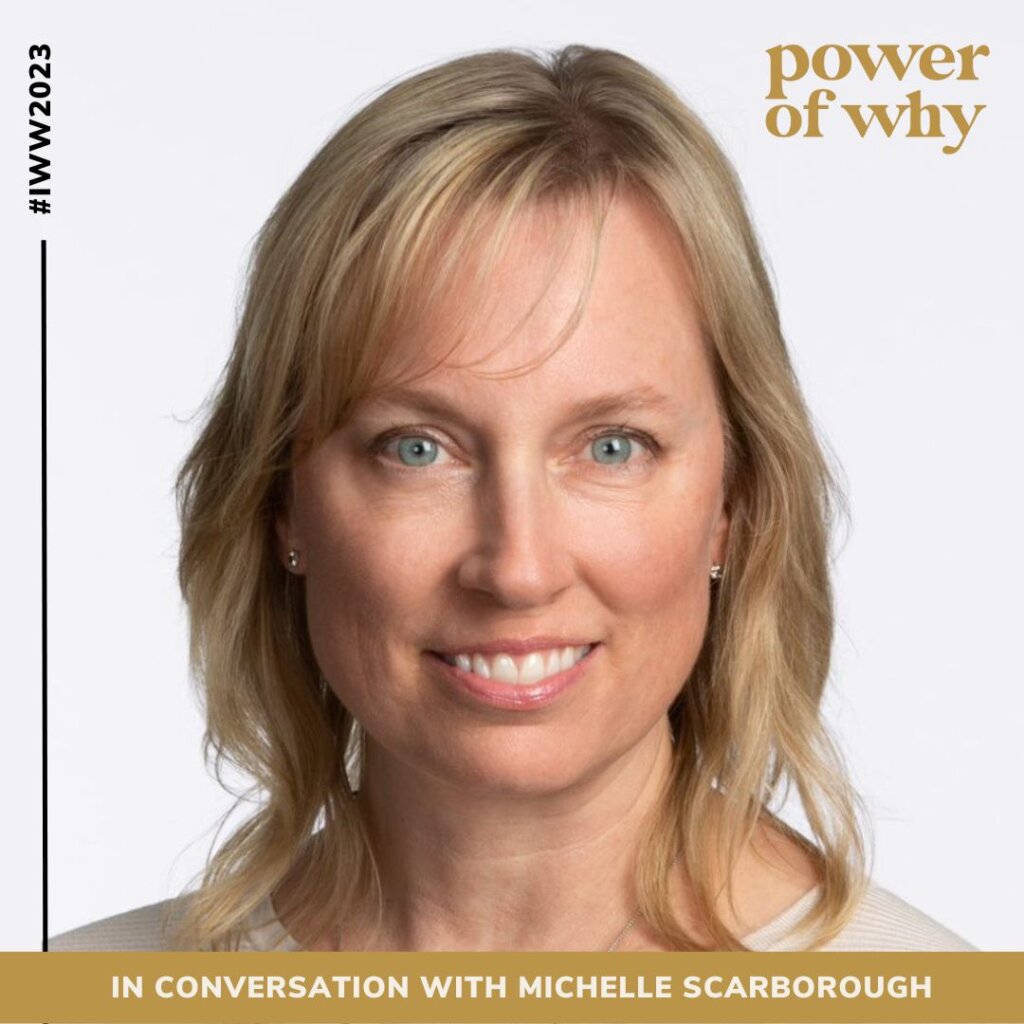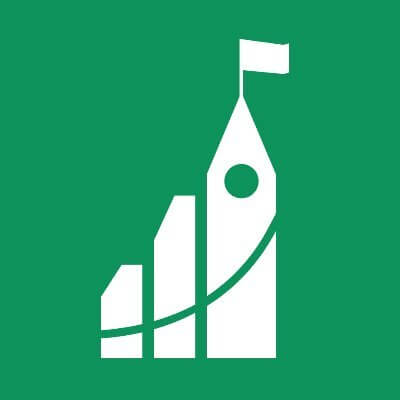Home » Michelle Scarborough on Building Something Bigger Than Yourself
Michelle Scarborough on Building Something Bigger Than Yourself

Mar 14, 2023
 This featured story is brought to you by the Power of Why Podcast in collaboration with Invest Ottawa, with critical support from BDC Capital’s Thrive Venture Fund and Title Sponsor of International Women’s Week. We teamed up to produce this special series to celebrate women leading in Ottawa for International Women’s Week (IWW 2023) and shine the spotlight on our IWW 2023 featured leaders to unpack their passion and purpose.
This featured story is brought to you by the Power of Why Podcast in collaboration with Invest Ottawa, with critical support from BDC Capital’s Thrive Venture Fund and Title Sponsor of International Women’s Week. We teamed up to produce this special series to celebrate women leading in Ottawa for International Women’s Week (IWW 2023) and shine the spotlight on our IWW 2023 featured leaders to unpack their passion and purpose.
Each year, five inspirational leaders are selected to represent International Women’s Week. They are role models achieving a significant impact on our economy, community and society, and embody the spirit, goals and values of IWW.
Building a business is a team sport. You’ve got the CEO’s vision, the product team’s execution, and marketing working with sales to attract and retain customers.
But when an unstable market threatens the stakes? That’s where Michelle Scarborough comes in.
Leading two of the world’s largest venture funds supporting women-led tech businesses — as Managing Partner of BDC Capital’s Thrive Venture Fund and Women in Technology Venture Fund — Michelle is levelling the playing field: laying the steady foundation for a more inclusive, creative and resilient future.
Here’s what she thinks it’ll take.
Listen to the episode on Spotify / iTunes / Google Podcasts
This episode is for you if:
- You’re an entrepreneur struggling to navigate this market
- You’re interested in becoming a venture capitalist
- You’re not sure if you should be investing more time in networking
- You want to know how BDC can help your business
Looking for a specific gem?
[3:18] The daughter of entrepreneurs
[5:16] It’s not about “what” she would be, but who she could impact
[9:53] Mentorship from men, and learning how to influence others
[11:33] Michelle isn’t afraid of failure
[17:09] What a “funky market” means for entrepreneurs
[17:38] What are you building? Who are your customers?
[18:12] Talk to your customers constantly
[20:54] What entrepreneurs always ask Michelle
[23:49] Creating entrepreneurial playbooks
[24:50] A responsibility Michelle doesn’t take lightly
[25:19] Managing funds is not for the faint of heart
[29:09] How to lead impactful teams
[30:20] Why Michelle works with entrepreneurs and investors
[31:00] What makes a great investor
[33:43] The best investment Michelle made for herself
[37:00] Where’s the puck going?
Listen to the episode on Spotify / iTunes / Google Podcasts
Tune in to the podcast or take the time to digest each article found below. Regardless of the format, there’s great content in store for you!
Naomi Haile: Tell us about your origin story.
Michelle Scarborough: I’m Calgary born and bred. My parents and grandparents were entrepreneurs. I was always curious and getting into trouble. I’m an Aquarius, we’re very humanitarian and future-looking. How can I be around people, and work together to create a better world?
I had lots of early experiences in media. I was a volunteer for the Red Cross, and they wanted somebody to be their community liaison in Calgary. I ended up on television every Friday at noon, talking about what people should be doing that weekend. It got me interacting with people in new ways.
“I didn’t know what I wanted to be when I grew up. I just thought, “I’m going to do something that’s going to impact the world, and I’m going to do it with lots of other people.”
Naomi: It sounds like you had the environment to express your creativity.
Michelle: My parents let us explore the world. I was a kid, so it was within limits that were healthy. We didn’t have much in the way of “You can’t do this,” it was more “Why do you want to do that? What’s important about it? How do you think it will impact you later?”
The whole rule in our household was the golden rule. Do unto others as you would have them do unto you. My parents were very philanthropic. We developed that muscle early on.
Naomi: What was it like when you started in business?
Michelle: My dad was a huge influence. He was entrepreneurial, both within a big organization and his own company. He taught me the tangible aspects of building a company and how to lead by example. He was an innovator and a proponent of making things better and iterating as you move forward.
“Business is dynamic, it doesn’t stay in one place. We evolve and the companies we’re building should evolve too.”
I carry that premise into everything. Disruption can be complicated. If something isn’t working, approach the problem differently.
Another big influence was Milton Wong, a philanthropist and investor in Vancouver. He was a mentor, boss and friend. By the luck of the draw I got these significant male mentors in my life, and some women, who helped me frame how to show up in the world. To influence others by example.
Naomi: Did mentorship help you learn the ropes before building your businesses, or was it something you did simultaneously?
Michelle: A bit of both. Leveraging mentors helps you get out there and try new things.
“The only limits you have are the ones you put on yourself.”
What will happen if I step over the ledge? I never fear failure. I’m going to try, and if it doesn’t work, I’ll try something else. At some point, I’ll figure it out. I have confidence in myself.
In Vancouver, I was part of the Board of Trade. We established a non-profit called Leaders of Tomorrow to help young people graduating university enter the workforce. That actually stepped me up because some of the students were outstanding.
When I was setting up companies it gave me access to this huge talent pool of smart people who would also benefit from gaining some experience. It works both ways.
“Building your network is half of it.”
Even if it’s just to go for a beer on a Friday night, those things really help: to bounce ideas off people and get support in ways you might not anticipate.
Naomi: BDC is doing incredible work helping entrepreneurs enter the market, compete globally, and get capital to grow. With such a huge mandate how do you set priorities for your team?
Michelle: Priorities shift every day: depending on the market, the companies in our portfolio and with those we might invest in later. When we started the fund in 2017, we had a white sheet to try and solve the issue of women not getting access to venture capital financing.
It was a huge gap, both when I was building companies and when I was on the other side of the table in different funds. Taking stock of where we started in 2017 to today is substantial. Our first fund was $200 million. Now we’ve launched the Thrive platform which is $500 million.
“How can we support the 29 portfolio companies in our Women in Tech fund? Not just in capital, but in networks, access to talent and customers — including BDC.”
What do you need to build a globally scaling business? We’re also looking at new opportunities. Who are those entrepreneurs? How can we bring value to them? This changes every day.
Naomi: In our last conversation you mentioned that this market is a little funky. What does that mean?
Michelle: Look at the stock market. Who knows what will happen tomorrow?
“In a funky market, entrepreneurs need to focus on what they’re building and who their customers are.”
Going back to “du unto others as you would have them do unto you,” your customers are paying for a service, software, hardware — whatever you’re building. Serve them well. Take care of their needs so they stay with you.
If what you’re building doesn’t feel like it’s fitting the market, ask customers for advice. At the fund, I’m constantly asking entrepreneurs what we need to be thinking about.
“A customer-centric approach is first and foremost because those people pay for your service. Keep them happy.”
Keep your team happy, too. Stay coordinated. If you have cracks in your foundation and the culture isn’t there you need to solve for it. You can only go to great places when you’re working together as a collective, building something bigger than yourselves as individual contributors.
“Collective movement allows you to move forward and have value. In this market, that’s more important than ever.”
Naomi: For the companies you fund, what are some of the most common things they come to you for?
Michelle: Talent. Last year we had the great resignation, and now we have the great awakening. Lots of talent has been let go, and there are lots of people in the market, so how do I identify top talent? How do I manage and retain them? And, if I need to, how do I downsize?
“Developing talent should always be top-of-mind. The other big thing is managing cash flow.”
How do I make sure that I have enough cash runway to manage my company and keep customers happy? How can I grow organically without new capital coming in?
The third piece is expansion. Even if it’s incremental, you’re opening a new channel: whether it’s in a region or you’re developing a strategic partnership. Do I have the right people to do this? What other resources can I leverage? Maybe it’s talking to other portfolio companies or people at local accelerators.
“How can I access people who have done this before, and set up systems to avoid repeating their mistakes?”
Creating playbooks eliminates the hassle for new entrepreneurs who want to attack a certain market.
Naomi: BDC capital has over $6 billion under management and is supporting some of Canada’s most innovative firms. What does that responsibility mean to you? Where do you hope it will lead?
Michelle: It’s a big deal. Managing venture capital funds or private equity is not for the faint of heart. You have to really want to do this, and understand what it means. It’s not just about doing a deal, and investing in a company.
“It’s a huge responsibility both to the people that have given you the money, and who trust you to deploy it with integrity, and the companies and teams that you believe will be a great investment.”
You need to trust those teams to steward that capital in the best interest of their company and shareholders. It’s significantly more difficult than most people would think, but it’s also one of the most honourable, rewarding and humbling experiences.
I work with amazing people doing incredible things. We can do autonomous driving and long-haul trucking. We can do drug discovery in a minute and not spend five years thinking about it in a lab and working on animal studies.
I would love to see a world where we have diversity in all funds. Where we’re investing in the most amazing entrepreneurs — whether they’re women, 2SLGBTQIA+, Indigenous, BIPOC — and helping to make Canada a place where people want to be and create.
Naomi: At the beginning of this episode, you mentioned this vision when you were a young person: to work with great people, solving problems.
Michelle: I never thought about that. It’s kind of worked out.
Naomi: You lead really strong teams. How do you develop talent?
Michelle: It’s evolving. Some members of my team have been with me in Fund One, but probably half of our team is new, from the Thrive Venture Fund and the platform itself. We’ve got some best practices, but the first alignment is around our mission.
If you believe in the mission, everything else will come. Are you curious? Do you have a background in entrepreneurship or as an investor? We have both on our teams. They’re complementary skill sets. We want to look like our audience, to make sure we can serve them in the best way.
“From a leadership development perspective, being a great investor isn’t about putting numbers into a spreadsheet. It’s about developing intuition and having an appetite to be a good partner.”
It could be calling a coach, mentor or advisor on the weekend because an issue came up and you’re not sure how to deal with it. It’s personal stuff, EQ [emotional intelligence] and IQ. That develops over time.
Technical skills are super important because we steward capital. At the same time, we want to develop that intrinsic, social skill so people can understand the highs and lows of being an entrepreneur. We’re right there with them. It’s BDC’s competitive advantage.
Naomi: What’s the best investment you’ve made in yourself?
Michelle: One is being part of the Kauffman Fellows. It’s not just a network of professionals — though we’re all Type A, high-performing venture capital investors — but the human side is unique.
The other thing is finding balance. It’s a work in progress. Setting my workouts in the calendar, and being very intentional about when I need to take the break to go and run in the trails or see my trainer. If somebody calls, they’ll be ok to wait an hour.
“I’ve struggled to do this, but if I don’t take care of myself, it will be harder to take care of others.”
Naomi: What’s one thing in your industry that you’re closely monitoring? Every other guest has talked about AI.
Michelle: AI is table stakes for us. I monitor it less because we’re already living it. This is going to sound very Canadian, but where is the puck going? There are major shifts happening on our planet and socially.
What does the world need, or what can it look like? What technology can help us get there? What do the companies need to look like? Where might they be, and can we create them here?
“AI and other forms of machine learning will be foundational to that, but what’s more important is where we want the world to be in the next five years, and how do we create that here, to be world leaders?”
Naomi: Sometimes it doesn’t look like we’re headed in a positive direction, but seeing what everyone can do matters.
Michelle: You flip the negative. What could the future look like? Put your energy into that, focus on the positive. We don’t need to have the answers, but we need to have the vision to create something that puts us in a better place.
Share a bit about your origin story.
Connect with Michelle
Connect with BDC
About the Power of Why Host, Naomi Haile

An intrapreneur, consultant, and interviewer.
Naomi Haile is curious about people, their paths and what drives them. In 2017, she launched the Power of Why Podcast. Her guests have taken the non-linear path in business, venture capital and other creative professions to share their story. Each episode explores people’s philosophy on life and work.
As we all navigate our lives and careers, Naomi hopes that everyone she connects with – guests and listeners – can shape products, companies, and communities of impact.
Naomi is a consultant at QuakeLab. She recently graduated from Columbia University, studying Human Capital Management.
Connect with Naomi
In support of its Women Founders and Owners strategy, Invest Ottawa offers programs and services that enable and accelerate the growth and success of women entrepreneurs from every walk of life. Visit www.investottawa.ca/women to learn more!
Invest Ottawa
https://investottawa.ca
Invest Ottawa, is Ottawa’s leading economic development agency for fostering the advancement of the region's globally competitive knowledge-based institutions and industries. Invest Ottawa delivers its economic development services through a unique partnership with the City of Ottawa, where the City and Invest Ottawa, through its members set the strategy and manage the programs that move Ottawa’s economy forward. Invest Ottawa is a non-profit, partnership organization that operates on an annual budget that comes from a variety of sources including: municipal, federal and provincial government; membership fees; professional development programs; and private sector contributions.


